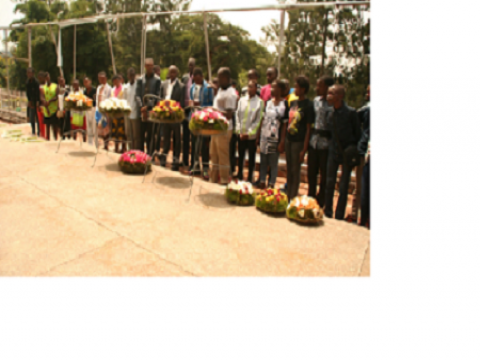In the process of building sustainable peace in Rwandan society, it is very imperative to empower post-genocide young generation with knowledge of genocide prevention and human rights education regarding what happened in Rwanda in 1994 genocide against the Tutsi. Currently, very many people in Rwanda are having mental problems and are traumatized by the consequences of those horrible acts.
Psychological effects of genocide are also relevant in youth. Youth who experience an extreme trauma at an early age are often incapable of fully understanding the event that took place. As this generation of children transitions into adulthood, they sort out the event and recognize the psychological effects of the genocide. It is typical for these young generations from genocide perpetrators families and genocide survivor families to experience symptoms of posttraumatic stress disorder as well as other psychological disorders due to what they observed and heard.
It is in that perceptive Peace Education Initiative Rwanda is more engaged in providing knowledge about preventing genocide and mass atrocities through training and trips to various memorial sites across the country. It promotes social cohesion, positive values including pluralism and personal responsibility, empathy, critical thinking and action to build a more peaceful society. It brings together experienced partners in the field of peace education and human right education as well. It has an integrated program of activities which engages many from decision makers to school children and young people across the whole country. Peace Education Initiative Rwanda believes that the good approach to healing those wounds is through genocide prevention and human right education and storytelling.
In this period of 24th Commemoration of genocide against Tutsi, Peace Education Initiative Rwanda organized training and trip to Kigali Memorial Centre where it gathered 5 clubs affiliated to the organization. The youth from those clubs were equipped with genocide prevention and human rights in order to build sustainable peace in their respective society. They have also explained the role of the young generation in building sustainable peace in Rwanda.
The objective of the training
- To connect post-genocide young generation to the past, engage and motivate them to build sustainable peace to the better future.
The impact of the training and trip
Those approaches have been impactful to our beneficiaries most especially youth of which critical thinking sessions are aimed at empowering youth to analyze issues critically in order to make informed decisions with the ultimate goal of fostering empathy, appreciation for diversity, open-mindedness, overcoming stereotypes & prejudices, rumors & evidence, blind obedience, manipulation and develop sense of self-responsibility. Public speaking and exchange have proven to be an effective way for youth to identify some of the challenges to peace in their communities and think together how to address some of these challenges using collaborative efforts which in turn has contributed to the increase of self -esteem and confidence. They have agreed to be peace builders and to change the mindset of some parents who have genocide ideologies and hatred. In addition, the post-genocide young generation who come from genocide perpetrators families works together with those of the victims of building peace in the society.
Hakizimana John is a club member of Peacedu said that he was ashamed to belong to the perpetrator’s family, but from now on he feels free because of what he learned. He also said that he is going to change the mindset of his family who still has genocide ideology. He also committed to being a peacemaker in his surrounding area. Also, Rudasingwa Felix said that the youth were manipulated to do horrible acts, but this training empower us to think critically and to avoid any hatred between us and it gave us the power to fight for peace and to become human right defenders. on top of that, Albert Rutikanga the Executive Director of Peace Education Initiative talked about genocide against Tutsi and other genocide took place in the world. In addition, Nshutiyimana Bradock le sage member of Board of Directors of Peace Education Initiative Rwanda highlighted the role of youth in preventing hatred and mass atrocities. Last, but not least, Claude Mugabe an Advisory Board member of Peace Education Initiative Rwanda talked about human rights education where he emphasized on the principles of human right.


